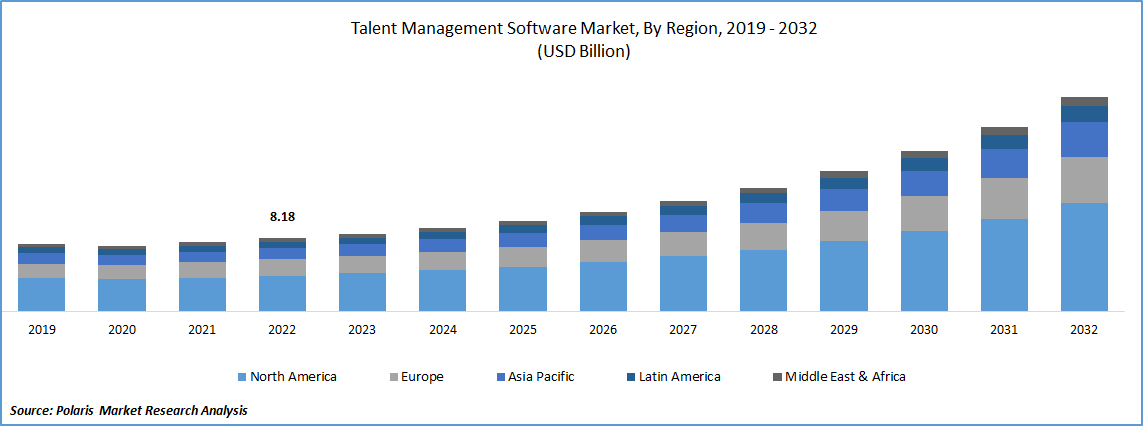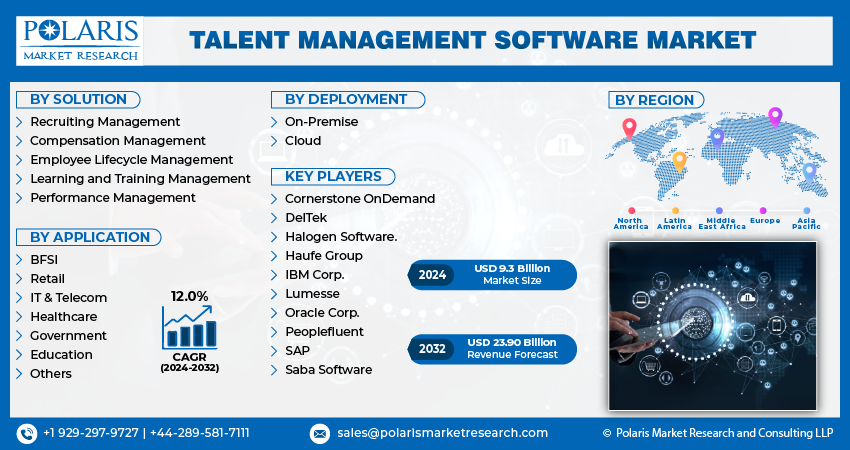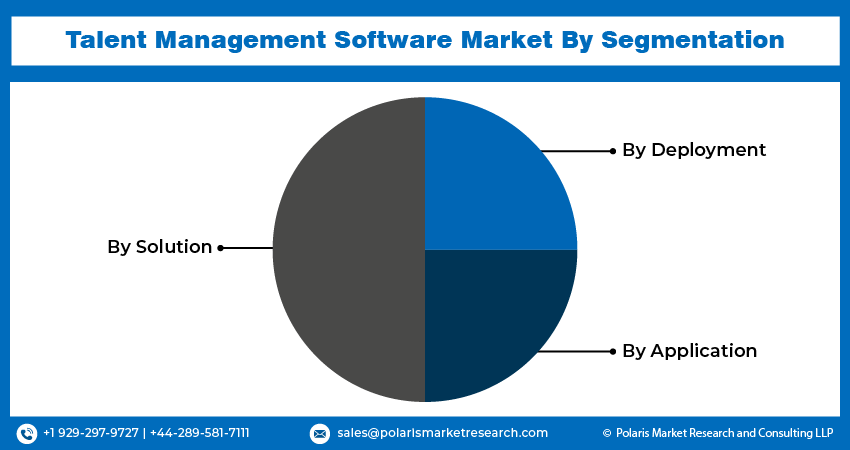
Talent Management Software Market Share, Size, Trends, Industry Analysis Report, By Solution, By Deployment (Cloud, On-premise), By Application, By Region, And Segment Forecasts, 2024 - 2032
- Published Date:Jan-2024
- Pages: 115
- Format: PDF
- Report ID: PM3776
- Base Year: 2023
- Historical Data: 2019-2022
Report Outlook
The global talent management software market was valued at USD 8.64 billion in 2023 and is expected to grow at a CAGR of 12.0% during the forecast period.
The process of managing human capital within organizations is continuously evolving to adapt to the changing landscape of the modern workforce. Several factors contribute to this evolution, including the expansion of diverse competencies, the emergence of specialized HR requirements, and the increasing complexity of talent management. As the job market becomes more specialized, recruiters are faced with the challenge of evaluating candidates based on niche and narrow criteria. Each specialized role may demand specific skills, qualifications, and experiences, making the recruitment process more intricate and demanding. Keeping records of employee performance, completing paperwork evaluations, scheduling training sessions, and managing individual compensation plans are among the many time-consuming tasks that HR managers must handle.

To Understand More About this Research: Request a Free Sample Report
Performing these tasks manually carries the risk of human error, which can have significant repercussions on an organization's operations and overall performance. To streamline HR processes, increase efficiency, and mitigate potential errors, organizations are increasingly turning to talent management software solutions. These software offers a comprehensive and integrated platform that automates and centralizes various HR functions. By implementing such software, HR managers can effectively manage recruitment processes, track employee performance, and maintain essential records accurately and efficiently. Moreover, talent management software provides tools to schedule and manage training sessions, ensuring that employees receive the necessary skills and knowledge to excel in their roles.
The industry is experiencing significant transformations due to the emergence of disruptive technologies like cloud computing and data analytics, particularly in the realm of workforce management within the organizations. Increasing adoption of web-based applications and digitization is a primary factor driving the growing demand for software solutions. As various industries increasingly embrace talent management tools and solutions, the market is expected to witness an influx of new and improved tools. The rapid adoption of these tools across different sectors is contributing to the continuous evolution and enhancement of software offerings in the market-place.
In multinational corporations (MNCs), HR managers have the responsibility of recruiting individuals who meet specific qualifications, possess a particular level of experience, come from specific academic institutions, fall within a designated age range, or have completed specific courses. This hiring process is referred to as competency-based recruiting. Human capital is crucial for organizations as it directly influences future gains in productivity, profitability, and service quality in today's highly competitive market. To enhance organizational growth, HR managers utilize talent management software to identify competency gaps that may be impeding the company's expansion. As a result, the market for talent management software is expected to witness substantial growth during the forecast period, driven by these factors.
Despite its potential for growth, the talent management software industry faces certain constraints. One of the main challenges is the lack of awareness regarding the numerous benefits that the software offers. Additionally, implementing talent management software requires substantial investments in terms of finances, time, and resources. Integrating technology to map talent at all levels of the organization can be costly, and resource scarcity makes it difficult for many businesses to invest in innovative technologies.

Industry Dynamics
Growth Drivers
Increasing number of social media and cloud users
Growth due to evolving trends, notably the increasing number of social media and cloud users. SaaS HR tools, particularly talent management systems, are gaining popularity and driving talent management software market expansion. These developments are seamlessly integrated into various mobile apps, leveraging the power of social media tools and consequently boosting the overall usage of such software. It is further fueled by the emphasis on employee engagement features. Effective recruitment, learning, and development practices play a pivotal role in enhancing employee engagement. Talent management functionality, including creative performance management, becomes instrumental in promoting employee engagement.
Market is experiencing new opportunities as the usage of social media platforms continues to grow. To cater to business demands, numerous apps and social media platforms are collaborating with talent management software providers. Moreover, the COVID-19 pandemic has further spurred the demand for talent management software. With employees working remotely during the pandemic, organizations heavily relied on talent management software to efficiently manage their operations.
Report Segmentation
The market is primarily segmented based on solution, deployment, application, and region.
|
By Solution |
By Deployment |
By Application |
By Region |
|
|
|
|
To Understand the Scope of this Report: Speak to Analyst
By Solution Analysis
Employee lifecycle management accounted for the largest share in 2022
Employee lifecycle accounted for major global share. Primarily driven by the growing emphasis on employee engagement, which extends beyond merely mapping employees but also focuses on retaining their talent and contributions. Compensation management segment witnessed steady growth. Compensation management has undergone significant transformations in recent years, with a shift towards employee participation and data analysis taking center stage. These advancements are driving the increased demand for such solutions in the market.
By Deployment Analysis
Cloud expected to grow at steady rate during forecast period
The growing popularity of cloud-based services is a major driver behind the segment's growth, primarily due to the numerous additional benefits it provides. Cloud-based solutions offer on-demand services, flexibility, and agility, making them highly appealing to organizations seeking efficient and adaptable solutions. While the on-premise segment currently holds the dominant position in the market, the future is expected to see a significant surge in the adoption of cloud-based solutions and services. More organizations are anticipated to opt for cloud-based offerings, recognizing the advantages they offer, leading to a shift towards cloud-based solutions becoming more prevalent in the coming years.
By Application Analysis
BFSI segment is anticipated to witness highest growth during forecast period
BFSI segment is expected to grow at highest CAGR. This is primarily due to the demand for human capital management solutions is fueled by the evolving dynamics of employee relations and the increasing reliance on digital management in the industry. IT and Telecom projected to have the largest share, owing to rise in investment in the sector for better services.

By Regional Insights
North America region dominated the global market in 2022
North America region dominated the global market. This is primarily due to its high level of technological adoption and abundant technical expertise in the industry. This region is expected to maintain its dominant position throughout the forecast period.
APAC is likely to emerge as fastest growing region. Region’s will be driven by the inclination towards adopting emerging technologies. Additionally, a significant transformation in the approach to organizational management in the region is contributing to the increased demand, particularly in developing countries.

Key Market Players & Competitive Insights
The industry exhibits a fragmented structure, comprising both large and small companies that offer a diverse array of products. Some companies provide integrated solutions to address broader business needs, while others focus on serving niche markets or offering specific functionalities as individual products or services.
Key players include:
- Cornerstone OnDemand
- DelTek
- Halogen Software.
- Haufe Group
- IBM Corp.
- Lumesse
- Oracle Corp.
- Peoplefluent
- SAP
- Saba Software
Recent Developments
- In November 2022, Deltek has recently introduced a new Integration Platform as a Service (iPaaS) solution called Deltek Unionpoint. With Deltek Talent Management, the authentication process is streamlined, and integrations can be customized more efficiently, resulting in accelerated integration processes.
- In June 2022, Cornerstone OnDemand completed the acquisition of the SumTotal, a leading provider of learning and human capital management software-as-a-service (SaaS). This strategic move aims to offer a more comprehensive and diverse range of solutions in the areas of learning, talent management, and overall people growth.
- In March 2022, Cornerstone OnDemand, completed the acquisition of the EdCast. This strategic move is intended to drive significant market growth, positioning Cornerstone OnDemand as a leading talent management SaaS platform provider. By integrating innovations from EdCast, the company aims to enhance its offerings and deliver added value to its customers.
Talent Management Software Market Report Scope
|
Report Attributes |
Details |
|
Market size value in 2024 |
USD 9.3 billion |
|
Revenue forecast in 2032 |
USD 23.90 billion |
|
CAGR |
12.0% from 2024 – 2032 |
|
Base year |
2023 |
|
Historical data |
2019 – 2022 |
|
Forecast period |
2024 – 2032 |
|
Quantitative units |
Revenue in USD million/billion and CAGR from 2024 to 2032 |
|
Segments covered |
By Product, deployment, application By Region |
|
Regional scope |
North America, Europe, Asia Pacific, Latin America; Middle East & Africa |
|
Key companies |
BM Corp., Oracle Corp., SAP, Peoplefluent, Cornerstone OnDemand, Haufe Group, Lumesse, DelTek, Saba Software, & Halogen Software. |
FAQ's
key companies in talent management software market are BM Corp., Oracle Corp., SAP, Peoplefluent, Cornerstone OnDemand.
The global talent management software market is expected to grow at a CAGR of 12.0% during the forecast period.
The talent management software market report covering key segments are solution, deployment, application, and region.
key driving factors in industrial talent management software market are increasing number of social media and cloud users.
The global talent management software market size is expected to reach USD 23.90 billion by 2032.
